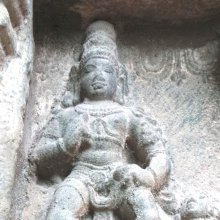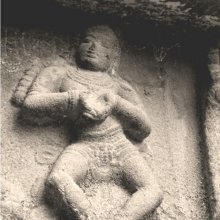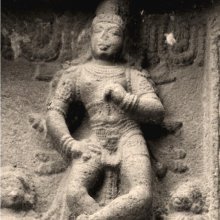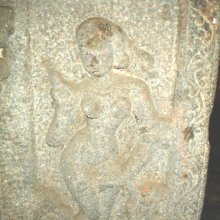Akshipta, Ākṣipta, Aksipta: 13 definitions
Introduction:
Akshipta means something in Buddhism, Pali, Hinduism, Sanskrit, Marathi. If you want to know the exact meaning, history, etymology or English translation of this term then check out the descriptions on this page. Add your comment or reference to a book if you want to contribute to this summary article.
The Sanskrit term Ākṣipta can be transliterated into English as Aksipta or Akshipta, using the IAST transliteration scheme (?).
Images (photo gallery)
(+2 more images available)
In Hinduism
Natyashastra (theatrics and dramaturgy)
Source: Wisdom Library: Nāṭya-śāstra1a) Ākṣipta (आक्षिप्त).—One of the 108 karaṇas (minor dance movement) mentioned in the Nāṭyaśāstra chapter 4. The instructions for this ākṣipta-karaṇa is as follows, “hands and feet to be thrown about swiftly in this Karaṇa.”.
A karaṇa represents a minor dance movements and combines sthāna (standing position), cārī (foot and leg movement) and nṛttahasta (hands in dancing position).
1b) Ākṣipta (आक्षिप्त, “revelation”) refers to ‘painful disclosure’ of the desired object of the plot. Ākṣipta represents one of the thirteen garbhasandhi, according to the Nāṭyaśāstra chapter 21. Garbhasandhi refers to the “segments (sandhi) of the development part (garbha)” and represents one of the five segments of the plot (itivṛtta or vastu) of a dramatic composition (nāṭaka)
(Description): “the unfolding of the seed in the development (garbha), is called revelation (ākṣipta)”.
2) Ākṣiptā (आक्षिप्ता) refers to a one of the thirty-two cārīs, according to the Nāṭyaśāstra chapter 11. The Ākṣiptā-cārī is classified as a ākāśikī, or “aerial”, of which there are sixteen in total. The term cārī refers to a “dance-step” and refers to the simultaneous movement of the feet (pāda), shanks (jaṅghā) and the hip (ūru). From these cārīs proceed dance as well as movements in general.
(Instructions): “one kuñcita foot thrown off and then placing it quickly on an Añcita foot by crossing the shank of the remaining leg”.
3) Ākṣiptā (आक्षिप्ता) refers to one of the thirty-three alaṃkāras (embellishments), according to the Nāṭyaśāstra chapter 29. These alaṃkāras, or, ‘embellishments of song’, depend upon the four types of varṇas, which refers to a specific order of musical notes (svara). They are attached to the songs of seven forms, although not generally used in the dhruvās.
According to the Nāṭyaśāstra, “ākṣiptaka is containing six kalās of three notes”.
Source: Shodhganga: Elements of Art and Architecture in the Trtiyakhanda of the Visnudharmottarapurana (natya)Ākṣipta (आक्षिप्त) refers to one of the 108 kinds of Karaṇa (“coordination of precise movements of legs and hands”), according to the Viṣṇudharmottarapurāṇa, an ancient Sanskrit text which (being encyclopedic in nature) deals with a variety of cultural topics such as arts, architecture, music, grammar and astronomy.—According to the Viṣṇudharmottarapurāṇa, karaṇas are the coordination of precise movements of legs and hands performed in a particular posture. The Nāṭyaśāstra also gives its view point in the same spirit. In the Viṣṇudharmottarapurāṇa, one hundred and eight kinds of karaṇas are accepted, e.g., Ākṣipta.

Natyashastra (नाट्यशास्त्र, nāṭyaśāstra) refers to both the ancient Indian tradition (shastra) of performing arts, (natya—theatrics, drama, dance, music), as well as the name of a Sanskrit work dealing with these subjects. It also teaches the rules for composing Dramatic plays (nataka), construction and performance of Theater, and Poetic works (kavya).
Vyakarana (Sanskrit grammar)
Source: Wikisource: A dictionary of Sanskrit grammarĀkṣipta (आक्षिप्त).—(l) taken as understood, being required to complete the sense; cf. क्विबपि आक्षिप्तो भवति (kvibapi ākṣipto bhavati) M. Bh. on III.2. 178;(2) a term used for the circumflex accent or स्वरित (svarita) as it is uttered by a zig-zag motion of the organ in the mouth caused by the air producing sound; cf. आक्षेपो नाम तिर्यग्गमनं गात्राणां वायुनिमित्तं तेन य उच्यते स स्वरितः (ākṣepo nāma tiryaggamanaṃ gātrāṇāṃ vāyunimittaṃ tena ya ucyate sa svaritaḥ) Uvaṭa on R. Pr. III. 1.

Vyakarana (व्याकरण, vyākaraṇa) refers to Sanskrit grammar and represents one of the six additional sciences (vedanga) to be studied along with the Vedas. Vyakarana concerns itself with the rules of Sanskrit grammar and linguistic analysis in order to establish the correct context of words and sentences.
In Buddhism
Mahayana (major branch of Buddhism)
Source: Wisdom Library: Maha Prajnaparamita SastraĀkṣipta (आक्षिप्त) refers to the “grasp” (of the activities of the fetters), according to the 2nd century Mahāprajñāpāramitāśāstra chapter 1.—Accordingly: [...] If the Bodhisattva were able to walk and talk as soon as he was born, people would say: “This man that we see is extraordinary, he must be a god, a nāga or a demon. The doctrine which he professes is certainly not within our reach. Transmigrating and fleshly beings as we are, in the grasp (ākṣipta) of the activities of the fetters, we do not have the capacity for it; who among us could attain such a profound Dharma?”

Mahayana (महायान, mahāyāna) is a major branch of Buddhism focusing on the path of a Bodhisattva (spiritual aspirants/ enlightened beings). Extant literature is vast and primarely composed in the Sanskrit language. There are many sūtras of which some of the earliest are the various Prajñāpāramitā sūtras.
Languages of India and abroad
Marathi-English dictionary
Source: DDSA: The Molesworth Marathi and English Dictionaryākṣipta (आक्षिप्त).—p S Objected to or disallowed--the position or some reply of the respondent (in argumentation).
Source: DDSA: The Aryabhusan school dictionary, Marathi-Englishākṣipta (आक्षिप्त).—a Objected to or disallowed.
Marathi is an Indo-European language having over 70 million native speakers people in (predominantly) Maharashtra India. Marathi, like many other Indo-Aryan languages, evolved from early forms of Prakrit, which itself is a subset of Sanskrit, one of the most ancient languages of the world.
Sanskrit dictionary
Source: DDSA: The practical Sanskrit-English dictionaryĀkṣipta (आक्षिप्त).—p. p.
1) Cast, thrown down.
2) Overthrown, repulsed; आक्षिप्तो जयकुञ्जरेण तुरगान् (ākṣipto jayakuñjareṇa turagān) Ratnāvalī 4.12.
3) Seized, grasped, snatched away; V.5.5.
4) Drawn, attracted, overpowered; कौतुक°, कुतूहल° (kautuka°, kutūhala°) Uttararāmacarita 4; seduced, enticed; K.281. मन्मथाक्षिप्तचेतसः (manmathākṣiptacetasaḥ) Bu. Ch.4.3.
5) Perplexed, distracted, bewildered; °मिव मे चेतः (miva me cetaḥ) Ve.2.
6) Insulted, reviled, abused.
7) Equal or equivalent to.
8) Interpolated, inserted, see प्रक्षिप्त (prakṣipta).
Source: Cologne Digital Sanskrit Dictionaries: Shabda-Sagara Sanskrit-English DictionaryĀkṣipta (आक्षिप्त).—mfn.
(-ptaḥ-ptā-ptaṃ) 1. Cast, thrown, tossed. 2. Thrown down or away. 3. Borne, carried. 4. Reviled, abused, blamed, ridiculed. 4. Equal or equivalent to. E. āṅ before kṣip to throw, kta aff.
Source: Cologne Digital Sanskrit Dictionaries: Cappeller Sanskrit-English DictionaryĀkṣipta (आक्षिप्त).—[adjective] hit, struck, touched.
Source: Cologne Digital Sanskrit Dictionaries: Monier-Williams Sanskrit-English Dictionary1) Ākṣipta (आक्षिप्त):—[=ā-kṣipta] [from ā-kṣip] mfn. cast, thrown down
2) [v.s. ...] thrown on the beach (by the sea), [Pañcatantra]
3) [v.s. ...] caught, seized, overcome (as the mind, citta, cetas or -hridaya) by beauty, curiosity, etc., charmed, transported, [Bhāgavata-purāṇa; Kādambarī; Kathāsaritsāgara] etc.
4) [v.s. ...] hung out or exposed to view (as flags etc.)
5) [v.s. ...] put into ([locative case]), [Mahābhārata iii, 3094]
6) [v.s. ...] pointed or referred to, indicated, [Sāhitya-darpaṇa] etc.
7) [v.s. ...] refused, left (as the right path), [Kāmandakīya-nītisāra]
8) [v.s. ...] insulted, reviled, abused, challenged, called to a dispute ([dative case]), [Kathāsaritsāgara]
9) [v.s. ...] caused, effected, produced, [Kathāsaritsāgara] [commentator or commentary] on [Bādarāyaṇa’s Brahma-sūtra]
10) [v.s. ...] n. ‘absence of mind’ See sākṣiptam.
Source: Cologne Digital Sanskrit Dictionaries: Yates Sanskrit-English DictionaryĀkṣipta (आक्षिप्त):—[ā-kṣipta] (ptaḥ-ptā-ptaṃ) a. Cast; thrown down; reviled; equal to.
Source: DDSA: Paia-sadda-mahannavo; a comprehensive Prakrit Hindi dictionary (S)Ākṣipta (आक्षिप्त) in the Sanskrit language is related to the Prakrit word: Akkhitta.
Sanskrit, also spelled संस्कृतम् (saṃskṛtam), is an ancient language of India commonly seen as the grandmother of the Indo-European language family (even English!). Closely allied with Prakrit and Pali, Sanskrit is more exhaustive in both grammar and terms and has the most extensive collection of literature in the world, greatly surpassing its sister-languages Greek and Latin.
Kannada-English dictionary
Source: Alar: Kannada-English corpusĀkṣipta (ಆಕ್ಷಿಪ್ತ):—
1) [adjective] thrown; cast away; projected.
2) [adjective] joined; associated with.
3) [adjective] calumniated; charged; accused.
--- OR ---
Ākṣipta (ಆಕ್ಷಿಪ್ತ):—
1) [noun] the act of making someone or something the object of scornful laughter by joking, mocking, etc.; derision; a ridiculing.
2) [noun] a wicked man.
3) [noun] one of the eight kinds of strokes in mace fight.
4) [noun] a particular movement of hands in dancing.
Kannada is a Dravidian language (as opposed to the Indo-European language family) mainly spoken in the southwestern region of India.
See also (Relevant definitions)
Starts with: Akshiptaka, Akshiptarechita, Akshiptarecita, Akshiptatva.
Ends with: Apakshipta, Arthakshipta, Avakshipta, Avyakshipta, Kanakalatakshipta, Parakshipta, Paryavakshipta, Pavanakshipta, Prakshipta, Sakshipta, Samakshipta, Samprakshipta, Upakshipta, Vyakshipta.
Full-text (+14): Akkhitta, Vyakshiptamanas, Vyakshiptahridaya, Samakshipta, Samakshepa, Akshepa, Sakshiptam, Vyakshipta, Sakship, Akshipt, Garbhasandhi, Akshiptika, Upasrita, Akshiptaka, Hasita, Vicitra, Sampradana, Paryastaka, Gatimandala, Parshvaccheda.
Relevant text
Search found 11 books and stories containing Akshipta, Ākṣipta, Aksipta, Ākṣiptā, A-kshipta, Ā-kṣipta, A-ksipta; (plurals include: Akshiptas, Ākṣiptas, Aksiptas, Ākṣiptās, kshiptas, kṣiptas, ksiptas). You can also click to the full overview containing English textual excerpts. Below are direct links for the most relevant articles:
Sahitya-kaumudi by Baladeva Vidyabhushana (by Gaurapada Dāsa)
Text 5.1 < [Chapter 5 - Second-rate Poetry]
Text 10.110 < [Chapter 10 - Ornaments of Meaning]
Text 10.107 < [Chapter 10 - Ornaments of Meaning]
Rig Veda (translation and commentary) (by H. H. Wilson)
Rig Veda 5.7.7 < [Sukta 7]
Hari-bhakti-kalpa-latikā (by Sarasvati Thkura)
Text 36 < [First Stabaka]
Natyashastra (English) (by Bharata-muni)
Vishnudharmottara Purana (Art and Architecture) (by Bhagyashree Sarma)
2.5. Karaṇa (movements of legs and hands) < [Chapter 3 - Drama and Dance]
Brahma Sutras (Shankaracharya) (by George Thibaut)
II, 1, 36 < [Second Adhyāya, First Pāda]





